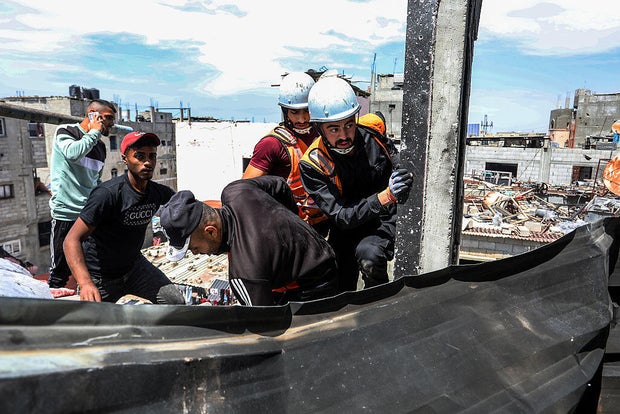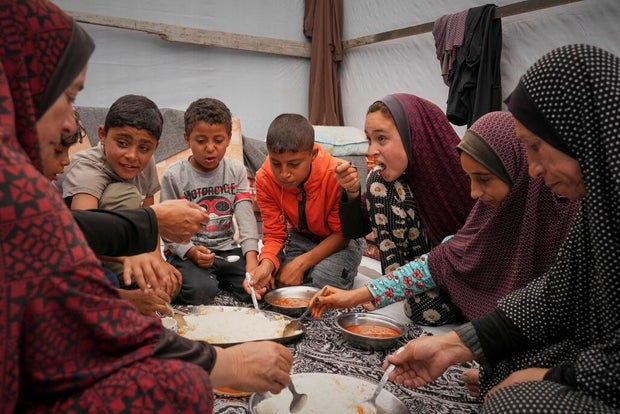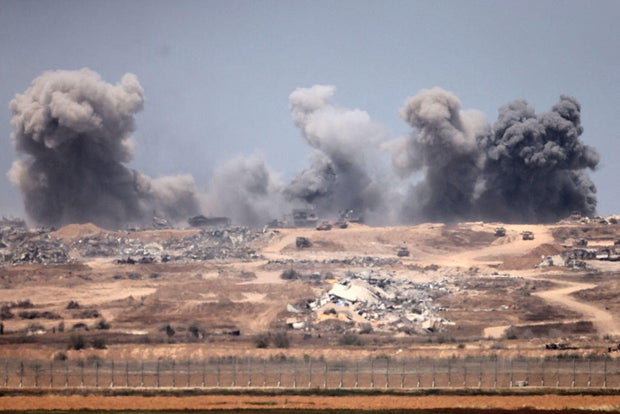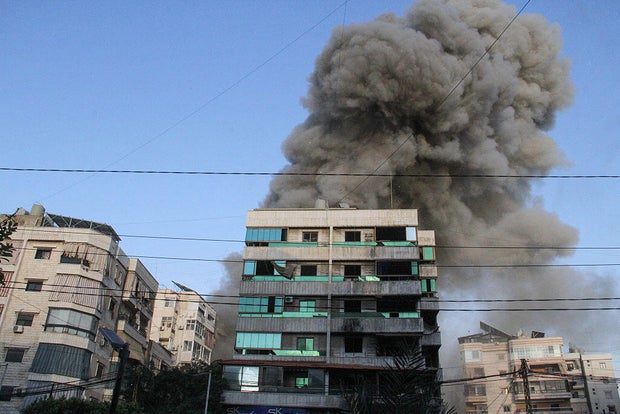Palestinian officials said the war in Gaza has killed more than 52,000 people, as Israel continues its renewed offensive on the territory after ending its ceasefire with Hamas in March.
The overall toll of 52,243 includes nearly 700 bodies for which the documentation process was recently completed, the Hamas-run health ministry said in its latest update. It comes after the hospitals in the Gaza Strip received the remains of 51 Palestinians over the past 24 hours, who were killed in Israeli strikes.
 Palestinians and civil defense teams conduct search and rescue operations in the damaged areas following the Israeli army's attack on settlements west of the city of Khan Yunis in the southern Gaza Strip on April 27, 2025.
Abed Rahim Khatib/Anadolu via Getty Images
Palestinians and civil defense teams conduct search and rescue operations in the damaged areas following the Israeli army's attack on settlements west of the city of Khan Yunis in the southern Gaza Strip on April 27, 2025.
Abed Rahim Khatib/Anadolu via Getty Images
Israel ended its ceasefire with Hamas, a designated terrorist group by the U.S. and Israel, by launching a surprise bombardment on the territory on March 18 and has since been carrying out daily waves of strikes. Ground forces have expanded a buffer zone and encircled the southern city of Rafah, and now control around 50% of the territory.
Israel has also sealed off the territory's 2 million Palestinians from all imports, including food and medicine, for nearly 60 days. Aid groups say supplies will soon run out and that thousands of children are malnourished.
Palestinians are now mainly living off canned vegetables, rice, pasta and lentils. Meat, milk, cheese and fruit have disappeared. Bread and eggs are scarce. The few vegetables or other items in the market have skyrocketed in price, unaffordable for most.
 The Al-Najjar family eats peas with rice in their family tent in Muwasi, on the outskirts of Khan Younis in the southern Gaza Strip, Friday, April, 25, 2025.
Abdel Kareem Hana / AP
The Al-Najjar family eats peas with rice in their family tent in Muwasi, on the outskirts of Khan Younis in the southern Gaza Strip, Friday, April, 25, 2025.
Abdel Kareem Hana / AP
"We can't get anything that provides any protein or nutrients," Mariam al-Najjar said.
Israeli authorities say the renewed offensive and tightened blockade are aimed at pressuring Hamas to release hostages abducted in its Oct. 7, 2023, attack that triggered the war. Prime Minister Benjamin Netanyahu has vowed to continue the war until Hamas is destroyed or disarmed, and all the hostages are returned.
Hamas has said it will only release the remaining 59 hostages — 24 of whom are believed to be alive — in exchange for Palestinian prisoners, a lasting ceasefire and a full Israeli withdrawal from Gaza, as called for in the now-defunct ceasefire reached in January.
Turkish Foreign Minister Hakan Fidan said on Sunday that talks with Hamas in recent days had shown the group is more open to an agreement that goes beyond a ceasefire and aims for a lasting resolution with Israel, Reuters reported.
 This picture taken from the Israeli side of the border with the Gaza Strip shows smoke plumes rising following explosions inside the Palestinian territory on April 27, 2025.
MENAHEM KAHANA/AFP via Getty Images
This picture taken from the Israeli side of the border with the Gaza Strip shows smoke plumes rising following explosions inside the Palestinian territory on April 27, 2025.
MENAHEM KAHANA/AFP via Getty Images
Hamas-led militants killed some 1,200 people, mostly civilians, in the Oct. 7 attack and took 251 people hostage. Most have since been released in ceasefire agreements or other deals.
Gaza's Health Ministry, which is controlled by Hamas, says women and children make up most of the Palestinian deaths but does not say how many were militants or civilians. It says another 117,600 people have been wounded in the war.
Israel says it has killed around 20,000 militants, without providing evidence. The military says it tries to avoid harming civilians and it blames Hamas for their deaths because the militants operate in densely populated areas.
Israel jets strike Lebanon
Israel jets struck Beirut's southern suburbs Sunday after issuing a warning about an hour earlier, marking the third Israeli strike on the area since a ceasefire took effect in late November.
There were no immediate reports of casualties.
In the warning, the Israeli military said it was targeting Hezbollah facilities in the Hadath area and urged residents to move at least 300 meters from the site before the strike. Two warning strikes followed.
In a statement following the strike, the Israeli military said it targeted a precision-guided missile storage facility for Hezbollah, the Iran-backed terrorist organization designated by the U.S. and Israel. It added that storing such equipment is a violation of the agreement reached to end the Israel-Hezbollah conflict.
Hezbollah has not responded to the strikes.
 Smoke billows from Israeli strikes following evacuation orders in Beirut's southern suburb on April 27, 2025.
-/AFP via Getty Images
Smoke billows from Israeli strikes following evacuation orders in Beirut's southern suburb on April 27, 2025.
-/AFP via Getty Images
President Joseph Aoun condemned the Israeli strike on Beirut's southern suburbs, calling on the United States and France, as guarantors of the ceasefire, to "assume their responsibilities" and pressure Israel to halt its attacks. He warned that Israel's continued actions "undermine stability" and risk exposing the region to serious security threats.
During the last Israel-Hezbollah conflict, Israeli drones and fighter jets regularly pounded the southern suburbs, where Hezbollah has wide influence and support. Israel views the area, where it has assassinated several of Hezbollah's top leaders, including chief Hassan Nasrallah last September, as a militant stronghold, and accuses the group of storing weapons there.
Sunday's strike follows two earlier attacks on the capital's southern suburbs, the first taking place on March 28, when Israel also issued a warning, and the second on April 1, when an unannounced strike killed four people, including a Hezbollah official.
Hezbollah leader Sheikh Naim Kassem recently warned that if Israel's attacks on Lebanon continued and if Lebanon's government doesn't act to stop them, the group would eventually resort to other alternatives.
Under the U.S.-brokered ceasefire that ended the 14-month Israel-Hezbollah war, Israeli forces were supposed to withdraw from all Lebanese territory by late January, while Hezbollah had to end its armed presence south of the Litani River along the border with Israel.
- In:
- Hamas
- Israel
- Gaza
- Gaza Strip











 English (US) ·
English (US) ·